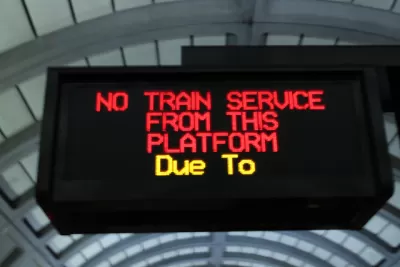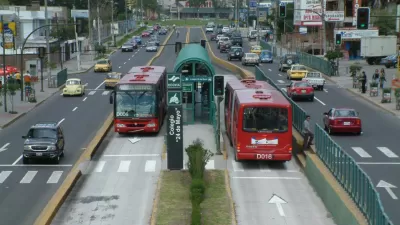Jarrett Walker discusses some reasons why transit authorities can be resistant to change. It all comes down to considering their point of view.

Putting yourself in a transit agency's shoes, says Jarrett Walker, is the best way to understand why they can be slow to change or innovate. Walker goes through a list of factors underlying that conservatism, including:
- Complex federal regulations: "I'm not commenting on the worth of each of these regulations, but can certainly testify to their cumulative impact. I've seen countless situations where elected officials were demanding that something get done fast, and the correct answer was that Federal mandates and processes simply prohibit that."
- Intentionally adversarial labor relations: "Most big cities have progressive elected officials who care about both transit workers and transit riders, but both of those voices have to be strongly present in the conversation, because ultimately they want opposite things."
- Conflicting direction from elected officials: "If you demand both ridership and coverage from your transit agency — and most people do want both — then you're giving contradictory direction, and someone needs to force you to be clearer about what the priorities are."
- A penchant for keeping things running smoothly: "So when some egghead planner shows up wanting to change the transit system, it's easy to see them as just another disruption — not fundamentally different from the car crash blocking the your rail line."
FULL STORY: Why Transit Authorities Sometimes Resist Change

Alabama: Trump Terminates Settlements for Black Communities Harmed By Raw Sewage
Trump deemed the landmark civil rights agreement “illegal DEI and environmental justice policy.”

Study: Maui’s Plan to Convert Vacation Rentals to Long-Term Housing Could Cause Nearly $1 Billion Economic Loss
The plan would reduce visitor accommodation by 25% resulting in 1,900 jobs lost.

Why Should We Subsidize Public Transportation?
Many public transit agencies face financial stress due to rising costs, declining fare revenue, and declining subsidies. Transit advocates must provide a strong business case for increasing public transit funding.

Paris Bike Boom Leads to Steep Drop in Air Pollution
The French city’s air quality has improved dramatically in the past 20 years, coinciding with a growth in cycling.

Why Housing Costs More to Build in California Than in Texas
Hard costs like labor and materials combined with ‘soft’ costs such as permitting make building in the San Francisco Bay Area almost three times as costly as in Texas cities.

San Diego County Sees a Rise in Urban Coyotes
San Diego County experiences a rise in urban coyotes, as sightings become prevalent throughout its urban neighbourhoods and surrounding areas.
Urban Design for Planners 1: Software Tools
This six-course series explores essential urban design concepts using open source software and equips planners with the tools they need to participate fully in the urban design process.
Planning for Universal Design
Learn the tools for implementing Universal Design in planning regulations.
Smith Gee Studio
Alamo Area Metropolitan Planning Organization
City of Santa Clarita
Institute for Housing and Urban Development Studies (IHS)
City of Grandview
Harvard GSD Executive Education
Toledo-Lucas County Plan Commissions
Salt Lake City
NYU Wagner Graduate School of Public Service





























